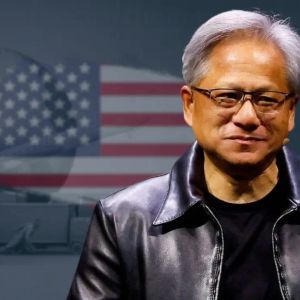Jensen Huang said China’s military can’t rely on Nvidia chips due to U.S. export limits
4 min read
Jensen Huang, the CEO of Nvidia, said he’s not concerned about China’s military getting access to his company’s AI chips, even as U.S. restrictions grow tighter and tensions with Beijing keep rising. Speaking in a CNN interview aired on Sunday, Jensen said the Chinese military can’t depend on American-made technology because “they simply can’t rely on it.” He added that it could be “limited at any time,” which, in his view, makes it too unstable to serve as a reliable base for China’s defense systems. According to CNN, Jensen made those remarks days before heading to China for the second time this year. The trip comes as Nvidia continues trying to balance its role as the global leader in AI hardware with increasing political pressure from Washington. Jensen insisted that China already has enough computing power within its borders and doesn’t need Nvidia hardware to advance its military capabilities. “They don’t need Nvidia’s chips, certainly, or American tech stacks in order to build their military,” he said. Jensen pushes back against Washington’s export rules The U.S. government has been targeting AI chip exports to China for years now, using policies that block companies like Nvidia from selling their most advanced products to Chinese customers. Jensen has never supported these rules. He called them “counterproductive,” saying they hurt the U.S.’s ability to lead the world in technology. “We want the American tech stack to be the global standard,” Jensen said . But in his view, that means reaching developers in every country, not just friendly ones. “Half of the world’s AI developers are in China,” he said. For the U.S. to stay ahead in AI, American companies have to be able to engage with China’s developer ecosystem. These policies have already hit Nvidia hard. In April, Washington rolled out new restrictions that blocked the company from selling certain AI chips to China. By May, Jensen said those rules had already slashed the company’s market share in China by nearly 50%. Despite that, Jensen isn’t stepping away from the market. Nvidia is reportedly developing a new chip that complies with current export controls so it can keep doing business in China without crossing legal lines. Jensen’s CNN appearance wasn’t just about policy. It came shortly after a meeting with U.S. President Donald Trump. Jensen was warned by lawmakers not to engage with any Chinese firms tied to the military or intelligence services, or any company already on America’s restricted export list. That includes names flagged for national security concerns. Experts question Jensen’s optimism while Nvidia tightens its strategy Daniel Newman, CEO of The Futurum Group, said Jensen is trying to keep both sides happy. “He needs to walk a proverbial tightrope to make sure that he doesn’t rattle the Trump administration,” Newman said. At the same time, he noted, Jensen also wants Nvidia to stay attractive to Chinese customers in case U.S. policies ease up. But Newman isn’t buying the idea that China wouldn’t use Nvidia’s hardware for military applications. “I think it’s hard to completely accept the idea that China couldn’t use Nvidia’s most advanced technologies for military use,” he said . Newman argued that any country investing in advanced AI, especially for military purposes, would likely benefit from Nvidia’s tech. And there’s some evidence to support that claim. A U.S. official told Reuters last month that DeepSeek, a Chinese AI startup, has been supporting China’s military and intelligence networks. DeepSeek claims it used Nvidia chips to train its language models. Jensen didn’t avoid that issue either. On Sunday, he addressed the concern over DeepSeek’s R1 model being trained in China. He acknowledged the fears but said there’s no concrete proof that it poses any danger just because it was developed in China. Jensen described the R1 as “revolutionary” and praised its open-source nature, arguing it allows startups and countries without access to huge resources to still participate in the AI race. To close the interview, Jensen pointed out the bigger picture. “The fact of the matter is, [China and the U.S.] are competitors, but we are highly interdependent,” he said. “To the extent that we can compete and both aspire to win, it is fine to respect our competitors.” Jensen seems determined to keep Nvidia in the game, no matter how difficult the rules get on either side of the Pacific. Cryptopolitan Academy: Want to grow your money in 2025? Learn how to do it with DeFi in our upcoming webclass. Save Your Spot

Source: Cryptopolitan



